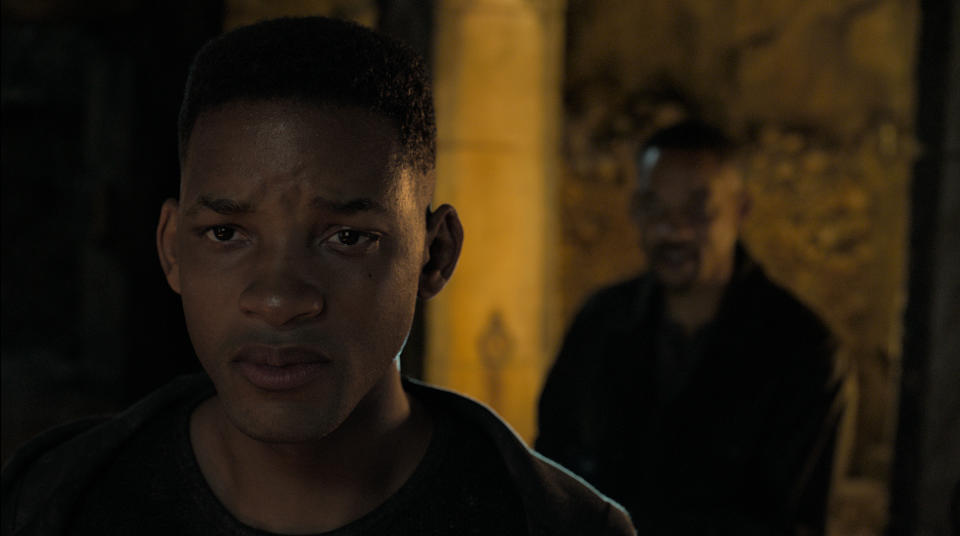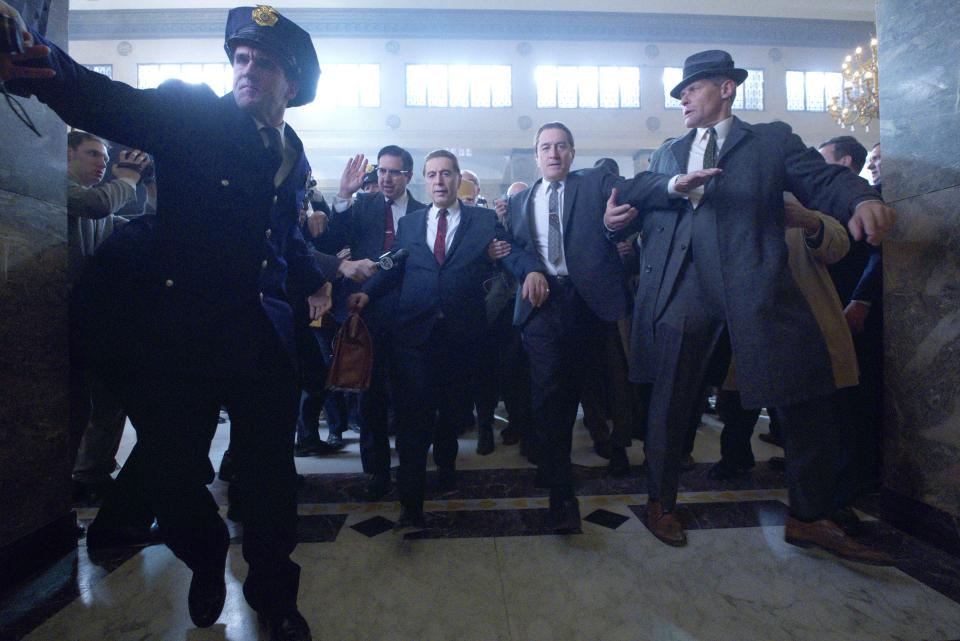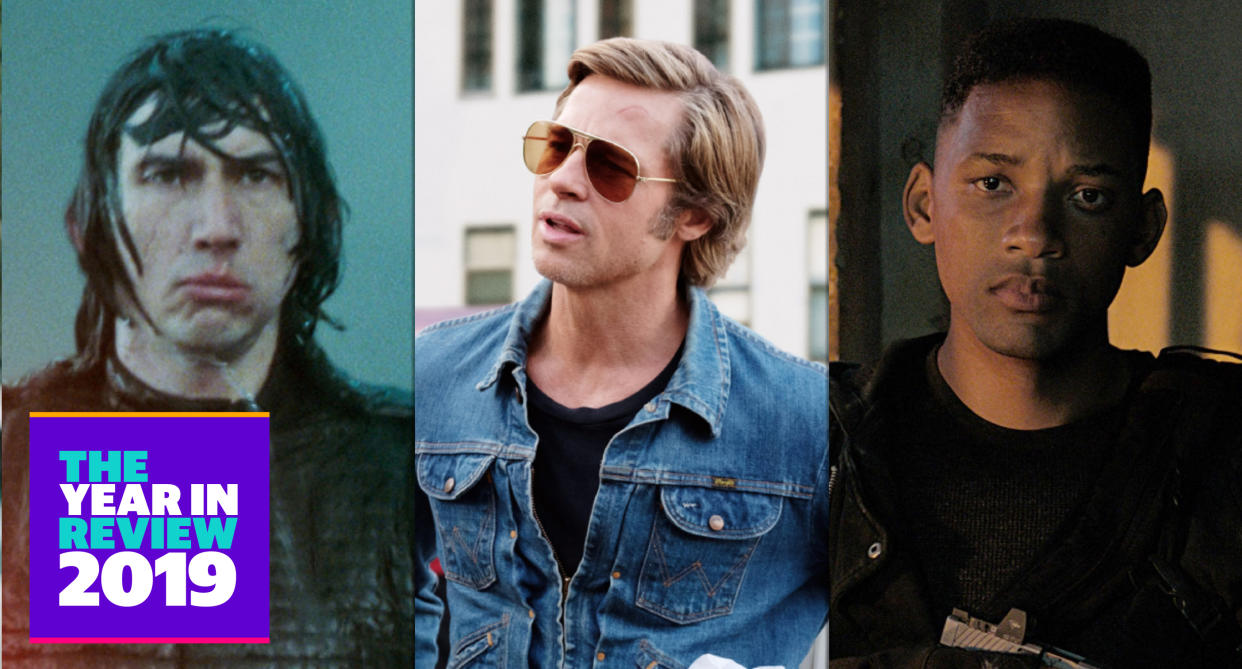2019's box office winners and losers, from 'The Rise of Skywalker' to 'Gemini Man'
Hollywood officially crowned a new global box office champ in 2019, as the mighty Marvel Studios team-up adventure Avengers: Endgame edged past James Cameron’s Avatar to become the highest-grossing movie in history. (At least until Avatar 2 comes out, of course.) But while there was much joy in the Marvel Cinematic Universe, back in our world there’s evidence that Hollywood at large kind of struck out. According to The Hollywood Reporter, overall domestic box office revenue plunged by nearly four percent this year, coming in at an estimated $11.45 billion compared to 2018’s record-setting $11.88 billion haul. Analysts are chalking that tumble up to the ongoing arrival of new home entertainment options — including new streaming services like Disney+ and Apple TV+ — as well as audience antipathy towards… well, towards almost every major blockbuster that wasn’t made by Disney.
On the other hand, the rest of the world still showed up in force: THR reports that overall global grosses are expected to equal or surpass the $41.1 billion benchmark set last year. And those overseas audiences didn’t just go to Disney films as the big international returns for Alita: Battle Angel, Hobbs & Shaw and Joker illustrated. Heading into 2020, that means that even as American audiences huddle around their inside screens awaiting Season 2 of The Mandalorian and the launch of HBO Max’s Game of Thrones prequel House of the Dragon, big-screen blockbusters will still find big success abroad.
Here’s Yahoo Entertainment’s round-up of the big winners and losers at the 2019 box office.
WINNER: The Mouse House becomes the inaugural member of the $10 billion club

This is what ubiquity looks like: The seven highest-grossing movies of 2019 all come from the same studio. (You could bump that number up to 7.5, since Spider-Man: Far From Home is shared by Sony and Disney.) Thanks to the combined global might of Avengers: Endgame, The Lion King, Toy Story 4, Captain Marvel, Frozen II, Aladdin and Star Wars: The Rise of Skywalker, Walt Disney made over $10 billion in a single calendar year, a first for any Hollywood studio. Even the movies that didn’t finish in the Top 10 contributed to the bottom line with Dumbo, Maleficent: Mistress of Evil and even Penguins kicking in some cash. While the good times are rolling now, it’s worth noting that the studio is heading into 2020 having wrapped up some of its biggest franchises and remade some of its most recognizable classics, so the chances of a repeat performance are steep. But by now, we’ve learned never to bet against the Mouse.
LOSER: Cats was a real dog at the box office

Universal had plenty to sing about in 2019, from successfully launching the first (of many) Fast & Furious spinoffs with Hobbs & Shaw to getting a piece of the superhero action courtesy of M. Night Shyamalan’s trilogy-capper, Glass. But the studio ended the year on an off-note, with a big-budget, all-star film version of Cats that was greeted with critical caterwauling and empty theaters. While some recent movie musicals — most notably The Greatest Showman — overcame early dismissal for a successful multiplex run, early box office returns suggest that the Jellicle Cats are doomed for an early curtain call. On the other hand, as Broadway fans like Captain Marvel herself continue to find and embrace Tom Hooper’s delightfully demented feature, Cats is likely to live multiple lives as a Rocky Horror-style midnight favorite.
WINNER: No joke… the DC Extended Universe is getting mightier

Even as a vocal segment of social media rallies around the quixotic #ReleasetheSnyderCut cause, moving past Dawn of Justice and Justice League in favor of solo adventures continues to be the best commercial course of action for the DCEU. Released in December 2018, James Wan’s Aquaman continued to print money for Warner Bros. well into the new year, while Shazam! provided a delightful springtime surprise and and the launching pad for Dwayne Johnson’s long-awaited superhero debut. But DC’s biggest villain ultimately proved to be its biggest hero, as Todd Phillips’s controversial Joker origin story banked $1 billion worldwide. Who needs the Snyder Cut when there’s a Lex Luthor one shot just crying out to be made?
LOSER: Warner Bros. whiffed with grown-up releases
While most of the major studios chased after four-quadrant franchises, Warner Bros. admirably attempted to release some grown-up movies in between would-be blockbusters like Detective Pikachu and Godzilla: King of the Monsters. The studio’s diverse lineup of adult fare included Clint Eastwood’s Richard Jewell; the period New York drama, Motherless Brooklyn; the mobster movie, The Kitchen; the literary adaptation, The Goldfinch; and the rousing Springsteen tribute, Blinded by the Light. What did all of these titles have in common? They all utterly failed to attract the attention of their target audience, as adults either stayed in to watch Netflix or indulged in the youthful nostalgia offered by Disney’s slate. The next time someone asks you, “Why doesn’t Hollywood make grown-up movies anymore?” just show them the box office returns for The Goldfinch.
WINNER: Once upon a time in Hollywood, Sony Pictures released a bunch of hit movies

The one adult movie that did rake in cash was Quentin Tarantino’s R-rated period piece, Once Upon a Time in Hollywood. (Although, to be fair, the Tarantino name is basically a franchise in and of itself.) Sony Pictures bankrolled the director’s lavish recreation of 1969 Los Angeles, and reaped the benefits of a nearly $400 million worldwide gross, and serious awards buzz. Sony has several other reasons to feel groovy about 2019. Spider-Man: Far From Home and Jumanji: The Next Level delivered blockbuster returns, Zombieland: Double Tap was a modest October surprise and the just-released Little Women is on track to be a holiday gift with an anticipated $25-35 million gross over the Christmas and New Year’s vacations.
LOSER: Sometimes dead franchises don’t come back

Jumanji might be Sony’s answer to Jurassic World, but the studio’s attempts to reboot two other dormant franchises — Men in Black and Charlie’s Angels — were the low points of an otherwise strong slate. Even the presence of Thor: Ragnarok double act Chris Hemsworth and Tessa Thompson couldn’t generate enthusiasm for Men in Black: International, while Elizabeth Banks’s take on the oh-so-’70s TV series (and oh-so-early 2000s feature films) inspired little to no nostalgia for either decade. Sony was far from the only studio who found failure in past IP successes, though. Paramount watched as Terminator: Dark Fate essentially terminated the Terminator franchise once and for all; Warner Bros. couldn’t get moviegoers to book a return trip to the Overlook Hotel with the belated Shining sequel, Doctor Sleep; and no one wanted to play with United Artists’s Child’s Play remake.
WINNER and LOSER: Two Will Smith’s are two too many

Although the public’s first glimpse of the Fresh Prince as Aladdin’s big, blue Genie was greeted with Cats-level horror, the live-action remake of Disney’s 1992 animated favorite went on to be a giant summer hit, banking over $350 million in the U.S. alone. Unfortunately, Smith didn’t get his wish to have two blockbusters in one year. Thanks to the magic of mo-cap (and de-aging technology), the actor starred opposite himself in Ang Lee’s high-tech thriller Gemini Man, but the movie fizzled with a $48 million domestic gross. The jury is still out on Smith’s third 2019 feature, the animated romp Spies in Disguise, which premiered over Christmas to so-so numbers. We’re expecting that Aladdin 2 announcement any day now.
WINNER: Some movies earned points (and dollars) for originality

You have to read pretty far down the list of the year’s top-grossing movies of the year — to No. 11 to be exact — to find a big hit that’s not based on a big piece of pre-existing IP. That movie is Jordan Peele’s Us, which scared up a mighty $175 million without any Avengers or Skywalkers in sight. The lack of franchise tie-ins didn’t hurt movies like Hustlers, Ford v. Ferrari, Good Boys or Knives Out either, all of which cleared or got within striking distance of the $100 million mark on the strength of their stars and screenplays. That used to be the M.O. once upon a time in Hollywood, but these days it’s practically an original approach to moviemaking.
LOSER: Playtime’s over for toy-based movies
Five years ago, The LEGO Movie’s $257 million domestic gross cracked the toy box open for merchandise-based kids’ movies. Jump ahead to 2019, though, and The LEGO Movie 2 proved to be a tough sell to family audiences; the star-packed sequel barely eked out $105 million domestically — a full $150 million less than its predecessor. On the bright side, that’s still $100 million more than another pair of toy-to-cartoon disasters, both of which were released by STX. First, Ugly Dolls was tossed on the trash heap with a mere $20 million, and then the long-delayed Playmobil: The Movie had one of the worst opening weekends in movie history en route to a final gross that barely cleared $1 million. Looks like Hollywood is once again realizing that movies make the toys, not the other way around.
WINNER: Downton Abbey is the new Star Trek

Fifty years ago, the USS Enterprise flew its last mission on the small screen. Forty years ago, Star Trek: The Motion Picture debuted in theaters and we’ve rarely been Trek-less since. In the ensuing decades, other TV shows have tried to make the leap, and Downton Abbey is one of the few that stuck the landing. The feature film version of the beloved British TV series — which ended its run in 2015 — wowed audiences on both sides of the pond, grossing $96 million in the U.S. and $36 million in the U.K. alone. (The film’s final global tally was $190 million.) That all but ensures that we’ll soon be seeing Downton Abbey II: The Wrath of Edith and Downton Abbey III: The Search for Matthew on the big screen, while franchise mastermind Julien Fellowes also shops around the TV spinoff, Downton Abbey: Deep Space Dowager.
LOSER: There’s no streaming in movie theaters

Netflix’s three big fall movies — Dolemite is My Name, The Irishman and Marriage Story — are absolutely worth their weight in Oscar nominations. But as far as cold hard cash goes, the streaming giant likely spent more money releasing those three movies for awards-qualifying theatrical runs than they took in at the box office. (Not that we’ll ever know, as Netflix doesn’t release financial data or viewership numbers.) We do have numbers for some of the films released by Netflix’s streaming rival, Amazon Studios, and… they’re not great, Bob. None of Amazon’s high-profile Sundance Film Festival acquisitions — Late Night, Brittany Runs a Marathon and Honey Boy — cleared $20 million at the box office. Small wonder that Amazon pulled a Netflix and declined to disclose domestic grosses for fall awards hopefuls like The Report and The Aeronauts.
WINNER: Parasite is a viral hit

It’s no secret that foreign language films struggle in the U.S. marketplace, but Bong-Joon Ho’s South Korean socio-thriller spoke to domestic audiences in a big way. Parasite’s buzz started building after its Palme d’Or victory at this year’s Cannes Film Festival, and since its general release in early October, the film has grossed over $20 million during its platform release, growing its audience with each new market. And the movie’s anticipated success with Oscar voters means more viewers will catch the #BongHive bug in the run-up to this year’s ceremony on Feb. 9.
LOSER: Moviegoers have voted, and politics are a box office vice
Adam McKay’s Dick Cheney satire Vice may have scored eight Oscar nominations earlier this year, but the movie largely played to empty houses, earning less than $50 million. History looks to be repeating itself with Bombshell, Jay Roach’s heavily-hyped Fox News expose that’s already claimed some high-profile nominations at the Golden Globes and SAG Awards for its triple threat acting team of Charlize Theron, Nicole Kidman and Margot Robbie. Commercially, though, the movie is gasping for airtime, earning only $5 million after two weeks in release. While Clint Eastwood’s Richard Jewell tried to bill itself as politically neutral, the film’s pointed criticism of the FBI and news media garnered pre-release controversy that probably contributed to its anemic $10 million gross. Apparently, the only political parties moviegoers are willing to tolerate are the Resistance and the First Order.
WINNER and LOSER: Star Wars: The Rise of Skywalker shows the Force — and the fury — of Star Wars fandom
In terms of opening weekend dollars, the saga-capping Star Wars: The Rise of Skywalker paled in comparison to its direct predecessors, earning only $176 million instead of the $248 million and $220 million that greeted The Force Awakens and The Last Jedi respectively. Box office analysts also noted that the film only received a B+ Cinemascore, suggesting that audiences weren’t thrilled with how J.J. Abrams wrapped up the Skywalker Saga. (The Twitter reaction tells a similar story.) But then a funny thing happened on the way to Exegol: Despite their apparent discontent, moviegoers made repeat visits to the far, far away galaxy anyway. The film grossed a massive $32 million on Christmas Day alone, and its global gross stands at a cool $500+ million, which means it’ll almost certainly approach or equal Last Jedi’s $1.3 billion global figure, even though The Force Awakens’s $2 billion stockpile seems out of reach. On the other hand, if they re-release the movie with a bonus Baby Yoda moment, that might single-handedly allow Skywalker to rise past the $3 billion mark.
Read more from Yahoo Entertainment:
Want daily pop culture news delivered to your inbox? Sign up here for Yahoo Entertainment & Lifestyle’s newsletter.



